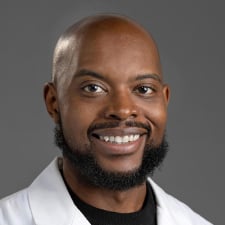As a medical student, do you ever wonder what it’s like to specialize in family medicine? Meet Carl Lambert, MD, a family physician and a featured doctor in the AMA’s “Shadow Me” Specialty Series, which offers advice directly from physicians about life in their specialties. Check out his insights to help determine whether a career in family medicine might be a good fit for you.
The AMA’s Specialty Guide simplifies medical students’ specialty selection process, highlight major specialties, detail training information, and provide access to related association information. It is produced by FREIDA™, the AMA Residency & Fellowship Database®.
Learn more with the AMA about the medical specialty of family medicine.
“Shadowing” Dr. Lambert
Specialty: Family medicine.
Practice setting: Outpatient clinic at academic center.
Employment type: Employed by Rush Medical Center in Chicago. Rush University System for Health is a member of the AMA Health System Program, which provides enterprise solutions to equip leadership, physicians and care teams with resources to help drive the future of medicine.
Years in practice: 11.
A typical day and week in my practice: No day is the same, but in a usual week, on Mondays and Wednesdays I am in the clinic, and I have a medical student doing their primary care clerkship or my clinic mentee in our Family Medicine Leadership Program. We're seeing patients back-to-back.
Then on Tuesdays and Thursdays, and some Fridays too, I’m classroom teaching. I do small group sessions with our first- and second-year students, and we go over cases together and break them down. It's pretty a cool flip-classroom approach. Then on Wednesday mornings I have my admissions committee day, where I interview medical school candidates and spend time voting, screening them and all that good stuff.
Fridays are also a mixture of things. It could be administrative work, emails, working on charts, lesson planning, meeting with student advisees and then other self-care things, like going to the gym, doing laundry, grocery shopping, stuff like that. If I'm on call, I work 40 hours or more per week, but the standard is 36 to 40 hours a week. But it's all split up and not just clinical. It's education, administrative and clinical stuff too.
The most challenging and rewarding aspects of family medicine: The best thing is journeying and seeing patients and students through challenging situations. You really get to see the ups and celebrate with them but also feel the lows. When a patient passes away or if someone in their family passes away, as their family doctor, I get to know everyone in the context of the family unit. So you feel very deeply for what's going on with your patients, which is kind of like a double-edged sword.
Being a family physician can be awesome, but it can also be very painful. It's very exciting because no day is the same. As a family doctor, I like that you can see a 90-year-old patient in one room and then a newborn in the next room. It's just a very cool experience that you have to constantly pivot and be comprehensive in your approach to seeing patients.
Another challenge is balancing the many needs that patients come in with. As a family doctor, you're the one-stop shop, so patients come to you for pretty much everything. Even if they see a specialist, you're the translator. They often say, “Well, I saw my cardiologist, but I don't even know what the heck they said.” So, what does that mean? It’s about that coordinated care.
Then sometimes the administrative stuff, like prior authorizations, fighting with insurance companies to get patients what they need, and fighting social determinants of health, can be challenging. For example, sometimes my patients want to exercise, but they don’t feel safe in their communities or they are in a food desert or don’t have reliable transportation. Those things add up to make our jobs harder than we would like them to be.
The impact burnout has on family medicine: Burnout in family medicine is a huge topic and has contributed to several issues, including feeling undervalued and a lack of recognition of what we do in health care, too much paperwork and administrative tasks or referral networks, and difficulty finding work-life balance. This is significant, as some studies show that over half of physicians report feeling burned out! This can lead to worsening shortages in primary care, compassion fatigue, decreased quality of care and even compromises in patient safety.
How Rush University Medical Center is reducing physician burnout: Indeed, burnout is multifactorial, but health systems play a significant part in lightening the load. This is especially important as I, as well as many other family doctors, believe that primary care is the backbone of our health care system and needs to be supported now more than ever!
Rush does a lot to head off burnout, including by streamlining administrative tasks, reducing paperwork, and leveraging technology to free up physicians to focus on patient care; offering flexible or part-time work schedules; fostering a culture of open communication and collaboration; equipping leaders with the skills to support and advocate for their physicians; focusing on creating a positive and supportive work environment; ensuring adequate staffing levels; implementing strategies to improve practice efficiency; ensuring that administrative policies align with the needs of physicians; and encouraging physicians to develop their leadership skills and practice self-care and mindfulness.
How my lifestyle matches, or differs from, what I had envisioned: It's about the same. But I would caution anyone who's trying to go into medicine: If you're trying to make bank, don't go into medicine. There are probably easier ways to do it.
Coming in, I kind of knew I would be a very frugal guy and that I wouldn't need a big mansion, all these crazy things. I just needed to make sure I could pay off my loans, provide for my family and live somewhat comfortably. I don't ask for much. Family medicine very much speaks to my natural demeanor because I'm a fairly low-key person and I just need a car to get me from A to B. I just need a roof over my head, make sure I'm in good health and know that those who are with me are OK. That is typical of family doctors—we humbly just want to make sure everyone else is OK, and we make the most with what we have.
Skills every physician in training should have for family medicine but won’t be tested for on the board exam: You have to be flexible. What I learned in medicine 10 years ago, some of that stuff has changed. I have to continue to be a lifelong learner and your patients depend on you for that. You also have to have the ability to go and look for answers or ask for help when you need it. That's something that you can't really teach. It's not going to be on a test, but it's a quality you have to have.
You have to have humility because, again, you're going to come across situations that you don't fully know. You might meet a patient from a different culture or background, and you have to be able to meet them where they are, and you can't make assumptions. You have to have humility to be in the position of letting the patient teach you how to help them—how to merge your medical knowledge with their background and then figuring out a plan.
You also have to be socially conscious because you can't practice from a place of privilege. Now we're in a very crystallizing moment where a lot of stuff is being talked about, such as gender inequality, racial justice, social justice, all these things. As doctors, we’re part of the larger public, so we have to be aware and we have to care about things because they are affecting our patients. The pandemic showed that. There's a sector of people who are being damaged and ravaged. And as doctors, we care about people, we treat people. We have to understand that and, again, be compassionate and aware to use those things to actually promote change in individuals and in populations.
One question physicians in training should ask themselves before pursuing family medicine: Be sure that you are sure. You should be comfortable not knowing everything and knowing where to find solutions. We're jacks of all trades, so we know a lot of things, but we still end up having to look up things from time to time. As long as you're comfortable being able to provide comprehensive care for a large amount of people and handling that, then you'll be a good family doctor.
Books, podcasts or other resources every medical student interested in family medicine should be reading: One is a book that my chair gave me: StrengthsFinder, by Tom Rath. It's about leadership. It's important to know what type of leader you are. Are you a collaborative leader? Are you a dictator or you're authoritative? Are you more data-driven? It's important to know how you're wired so that you can capitalize on your strengths and then also work on your weaknesses too.
The “American Family Physician Podcast” is helpful for physicians and trainees to stay abreast of issues pertinent to our specialty, as well as an opportunity to stay current with continuing medical education.
The "Society of Teachers of Family Medicine Podcast" is another resource. It features conversations about key areas at the intersection of academic medicine, leadership, health equity and medical education.
Additional advice I would give to students who are considering family medicine: Family medicine is great. If that is truly how you feel in your heart, then follow it. Unfortunately, sometimes in medical school there is still this hidden curriculum where students can sometimes be steered consciously or subconsciously to pick things that are more lucrative or more prestigious.
But don’t let the culture make you feel that picking something like primary care is somewhat less than. It’s a noble profession and you can do a lot of good. You don’t necessarily see all of the good right up front. The rewards are probably 10 years down the line, but you’re adding years to people’s lives. It’s different from being in the emergency department, saving the gunshot victim. But you’re saving lives just the same.
Just believe in yourself. Medical school is hard—it was hard for me. It's supposed to be hard. I was just telling students the other day to believe in yourself, have community, be discerning of who you choose to be your mentors and who speaks life into you. Make sure you're selective of who that is, and make sure that they mean you well and care about you just as much as they care about themselves. If you have those building blocks, you can go far.




